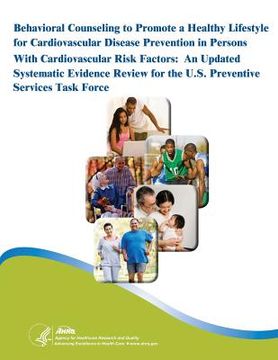Behavioral Counseling to Promote a Healthy Lifestyle for Cardiovascular Disease Prevention in Persons With Cardiovascular Risk Factors: An Updated Sys (en Inglés)
Reseña del libro "Behavioral Counseling to Promote a Healthy Lifestyle for Cardiovascular Disease Prevention in Persons With Cardiovascular Risk Factors: An Updated Sys (en Inglés)"
A healthy diet promotes health and reduces an individual's risk for chronic disease through nutritious eating patterns. For the purposes of this review, we will include any dietary counseling interventions that promote a balanced diet (e.g., appropriate energy content); balance of fats (e.g., consumption of mono and poly unsaturated fats, omega-3 fats, avoidance of excess saturated fat, avoidance of trans fat); increased consumption of fruits and vegetables; increased consumption of legumes; increased consumption of lean proteins; increased consumption of nonfat or low-fat dairy; balance of carbohydrates (e.g., consumption of whole grain and fiber; avoidance of excess refined carbohydrates, including excess sweetened beverages); and avoidance of excess sodium. This guidance is generally consistent with dietary recommendations of a number of groups, including the Institute of Medicine, the World Health Organization, the U.S. Department of Health and Human Services (DHHS), the U.S. Department of Agriculture, the Academy of Nutrition and Dietetics (previously the American Dietetic Association), the Centers for Disease Control and Prevention (CDC), the American Heart Association (AHA) and American College of Cardiology (ACC), the American Cancer Society, and the American Diabetes Association. We did not review dietary counseling interventions that only focused on micronutrient intake, vitamin and/or antioxidant supplementation, or alcohol moderation. Although no internationally accepted definition of physical activity exists, American researchers have defined physical activity as "bodily movement produced by the contraction of skeletal muscle that increases energy expenditure above the basal level." DHHS and other organizations recommend that adults age 18 years and older should engage in at least 150 minutes of moderate-intensity or 75 minutes of vigorous-intensity aerobic physical activity per week, in addition to engaging in strengthening activities at least twice per week. Based on these definitions, this review focused on counseling interventions promoting aerobic- or strength-related physical activity. Risk factors for CVD are well established and include both modifiable and nonmodifiable components. Modifiable risk factors include: dyslipidemia or hyperlipidemia (referred to as dyslipidemia in this report), hypertension, diabetes, overweight and obesity, smoking, lack of physical activity, and unhealthy diet. Nonmodifiable risk factors include: age, sex, and family history. This review focuses on patients who are at high risk for CVD, which we defined as having one or more of the following risk factors: dyslipidemia, hypertension, impaired fasting glucose/impaired glucose tolerance, and/or metabolic syndrome. Metabolic syndrome is a clustering of metabolic risk factors that include abdominal obesity, dyslipidemia, increased blood pressure, insulin resistance, or glucose intolerance. While diabetes is a strong risk factor for CVD, we considered existing diabetes to be a CVD risk equivalent. As such, we did not review studies primarily aimed at patients with diabetes or pre-existing coronary heart disease, cerebrovascular disease, peripheral artery disease, or severe chronic kidney disease.

